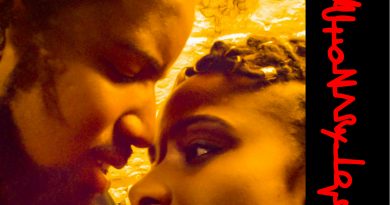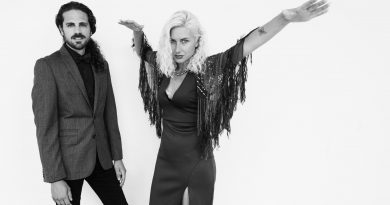A Chat with Brandes (17.04.25)
In a career that has spanned the worlds of politics, literature, and now music, Brandes has never shied away from tackling the profound questions of identity, memory, and justice. Known to many as a thoughtful political voice and acclaimed author of The Last Train – A Family History of the Final Solution, he now steps into a new chapter as a singer-songwriter under the name Brandes – a deeply personal reclamation of his family’s history and a poignant tribute to those who came before him. What follows is an exploration of art, memory, and the enduring human desire to create meaning, even, and perhaps especially, in the face of loss.
OSR: You’ve had a distinguished career in politics and writing. What compelled you to step into the world of music at this stage in your life?
Brandes: I hope it’s been in some way distinguished, but as important as politics has been to me, and still is, it’s never been all my life. Before the need for a career intervened, I’d dreamed of being a writer or a poet, and now that I’ve a chance to dream again, I do feel compelled to take it.
OSR: The name Brandes carries deep historical weight. Can you talk about the emotional process of reclaiming it for your musical identity?
Brandes: Brandes is my father’s family name. He changed it when he joined the British army in 1942. He was one of the lucky few German Jews who managed to escape the Nazis. The book I wrote, The Last Train – A Family History of the Final Solution, is the story of generations of my family and, in particular, of my grandparents who were deported to Latvia and murdered there. My reclamation of the name is a form of tribute to them and an act of defiance against the kind of people, now as well as then, who would deny others their rights and, ultimately, their lives. It’s also important to me that people listen to my music solely on its merits, and the alias helps distance me as a singer-songwriter from the former politician.
OSR: The Distance Between Dreams often feels like a meditation on loss, memory, and identity. Was there a specific moment or experience that sparked the creation of this album?
Brandes: Many of my ideas and inspirations come to me in that half-light between wakefulness and sleep, which, in part at least, accounts for the album title. The line “there was ice on her eyelids and flakes in her hair” came to me out of the blue and wouldn’t let me alone until I’d written ‘The Bridge’. That song’s about the break-up of a relationship, but it’s also set against the backdrop of London in the eerie light of the dawn, which I experienced as a teenager and have never forgotten. That was the first song I wrote, and it triggered the rest. Almost all of them relate in one way or another to memories or ideas that are important to me.
OSR: Your lyrics feel incredibly personal. How do you navigate the vulnerability of sharing such intimate reflections through music?
Brandes: I’ve tried to achieve clarity of thought and honesty of emotion in my songs. Some are ‘personal’ in that they seek to capture an experience and to convey how it felt then and what it means now; some are more ‘public’ and address political issues important to me. But all depend on their capacity to find a point of connection with individual listeners and their own thoughts and experiences. So honesty and authenticity are of the greatest importance to me, and my vocal approach is designed to deliver the words, the ideas and experiences behind them, as clearly as possible, so that the listener is free to find his/her own meaning in them.
OSR: You’ve cited Leonard Cohen, Joni Mitchell, and Nick Drake as influences. How did their work shape your songwriting approach?
Brandes: I admire Cohen for his lyricism, profundity and humour and Mitchell for her emotional honesty and observational directness. Nick Drake is perhaps less of an influence, but I find his fragility both painful and inspiring. I’m very clear that I’ve written lyrics, as distinct from poetry, and I feel that’s what they’ve done: the music is the medium through which the words are expressed and heard. With them, every word is clear, every word is truthful and not a word is wasted. That’s what I aspire to.
OSR: ‘Song for Mordecai’ is an epic, historically rooted track. Why did you choose Daniel Deronda as a source of inspiration, and what did it allow you to say musically that prose could not?
Brandes: Daniel Deronda was and remains a ground-breaking novel.150 years ago, George Eliot was perhaps the first great figure in English literature to write about Jews with understanding and sympathy. The song is a form of tribute to her, but it also reflects the struggles and tragedies of the Jewish people from her time to ours.
OSR: As someone who has written extensively about the Holocaust, how does music help you explore or process that history differently than prose or policy?
Brandes: My book tried to answer the question: why did my grandparents’ former friends, neighbours and fellow citizens put them on the train that carried them away to their deaths? The novel I’m writing addresses the same question. I’m not so much interested in Jews or Gentiles or any other race, religion or nationality, but in the human condition. What makes us do terrible things? And how can we teach ourselves to do wonderful things instead? When I write prose, I attach the greatest importance to reason. Music allows me more scope to explore my emotions.
OSR: ‘From The Higher Ground’ brings in a more overtly political tone how do you see the role of the artist in today’s political climate?
Brandes: My song-writing project was originally called ‘Political Songs’. Actually it still is. Some of my songs are intensely personal, others more public. But they all come from the same need to find a way for the good to overcome the bad. The artist has a platform and a right to use it. But we shouldn’t be looking to artists, or to politicians for that matter, for the answers we seek. We should be looking at ourselves.
OSR: Do you think music has the power to reach people in ways that political speeches or books cannot?
Brandes: Art that’s rooted in our common experience has the potential to help us to come to terms with the difficulties in our lives, to reveal truths that were hidden from us and to uplift and inspire us. Music, painting and literature can all do that. But a great speech is also a work of art.
OSR: Looking back, does this album feel like a destination for you or just the beginning of a new creative path?
Brandes: It’s more a new return to an old beginning. I’ve almost completed a second album, am working on a novel and have a folder full of projects I began decades ago and may yet complete. Life’s for living.
Many thanks to Brandes for speaking with us. Find out more about Brandes on their Instagram and Spotify.


